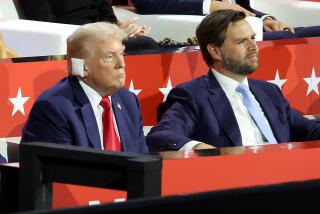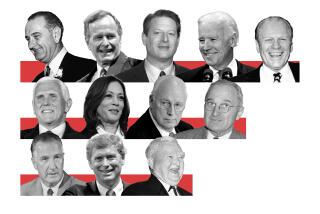Bush Says He’d Keep Quayle on the Ticket in ’92
WASHINGTON — President Bush has given Vice President Dan Quayle a dramatic vote of confidence, declaring that Quayle would “absolutely” be his choice for a running mate in 1992.
The President’s remark, contained in an interview with the Dallas Morning News scheduled for publication today, appears to resolve at an extremely early date whether Quayle will remain on the Republican ticket if Bush seeks renomination as expected.
In addition, the President offered the endorsement at a time when the vice president is still struggling to establish his credentials, at least in the eyes of many Americans who continue to profess doubts about his capabilities.
Although the next presidential election is three years away, the names of potential rivals for the vice presidential nomination have continued to appear in print, if not in serious political discussions among Republicans, to the irritation of the vice president’s supporters.
So far, Bush has done nothing to suggest he is anything less than satisfied with the performance of his 42-year-old vice president, whom he lifted from relative political obscurity a little more than a year ago.
Hours after arriving in New Orleans for the Republican National Convention in August, 1988, Bush announced that he had picked the eight-year veteran of the Senate from Indiana as his choice to be the Republican vice presidential candidate.
In recent months, the President has hedged when asked whether Quayle would remain on the Republican ticket in 1992. He generally suggested that it was too early to focus on the matter, and declined to commit himself.
But in the newspaper interview, conducted Thursday, Bush took a large step apparently intended to end any doubts about the vice president’s future. When asked, “Are you going to keep Dan Quayle on the ticket in 1992,” Bush replied:
“Absolutely. He’s doing a very good job, an outstanding job. And I think he’s been an outstanding vice president, doing exactly what I want him to do and doing it because his heart is in it.”
Asked whether Bush’s comments amounted to an endorsement of such certainty that the President had left himself no room to change his mind and dump Quayle, Deputy White House Press Secretary Roman Popadiuk said: “The President’s words speak for themselves.”
Quayle has professed to have little interest in the matter, even as the questions about his abilities that dogged him during the presidential campaign a year ago have persisted after he took office.
In a television interview in September, Quayle declined to say if he wanted to be on the 1992 ticket as Bush’s running mate. “Ask me that question in about August, 1992,” he said.
Opinion polls have shown that the public’s reservations about Quayle have persisted. A Washington Post-ABC News poll in August showed that 52% of those surveyed considered Quayle unqualified to sit in the Oval Office if something should happen to the President.
When asked if Bush should select a different running mate if he seeks a second term in 1992, 43% of those surveyed said he should, while 38% said he should not.
To counter those perceptions, the vice president’s aides and senior White House officials have moved to portray Quayle as offering the same sort of quiet, behind-the-scenes support that Bush, as vice president, was said to have given Ronald Reagan for eight years.
A senior presidential aide pointed out Saturday that Quayle had played central roles in formulating budget strategy and in several key battles of the President’s first year in office.
Those battles include Bush’s efforts to lower the capital gains tax, to obtain his full budget request for the Strategic Defense Initiative and to win confirmation of the nomination of former Sen. John Tower to be defense secretary. In all three instances, the aide neglected to point out, Bush has not prevailed.
“The vice president has gone up and talked with literally half the Senate in the past couple of weeks to get a direct reading” on the likely course of deficit-reduction efforts and the capital gains fight, said Richard G. Darman, director of the Office of Management and Budget.
“He’s been able to provide a lot of solid information, and insight,” Darman said. “He’s got a great deal more natural talent than the press has given him credit for. There’s no doubt about his raw talent.”
Darman noted that questions some may have harbored about Quayle’s maturity have been answered by the vice president’s “race up the learning curve.”
Questions about whether an incumbent vice president would be retained for a second term are common.
Well into his own first term as vice president, Bush faced questions about whether he would be Reagan’s choice for a second term, in the face of skepticism about his dedication to conservative causes on the part of Reagan’s most ardent conservative supporters.
Similarly, Nelson A. Rockefeller faced such questions as Gerald R. Ford’s vice president, and eventually Ford picked Sen. Bob Dole (R-Kan.) as his running mate in 1976.
While White House aides offer support for Quayle, he has been identified as a key figure in policy disputes over the correct U.S. approach to the dramatic economic and political relaxation taking place in the Soviet Union and in much of Eastern Europe.
In public statements, Quayle has sided with those who would view the changes with considerable caution, and Secretary of State James A. Baker III has argued for a more aggressive policy intended to try to take advantage of the shifts.
Baker, a longtime and close friend of Bush who served as his top campaign aide and adviser in 1988, was known a year ago to have questioned the wisdom of putting Quayle on the ticket. More recently, his apparent policy disputes with the vice president, while extremely low-key in public, have given rise to perhaps unfounded speculation that he may view Quayle as a rival for the presidency seven years from now.
More to Read
Get the L.A. Times Politics newsletter
Deeply reported insights into legislation, politics and policy from Sacramento, Washington and beyond. In your inbox three times per week.
You may occasionally receive promotional content from the Los Angeles Times.










